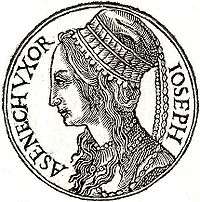Asenath
Asenath (/ˈæsɪnæθ/, Hebrew: אָסְנַת, Modern: ʾAsənat, Tiberian: ʾĀsenaṯ) is a minor figure in the Book of Genesis.

)-Bode_museum-_Berlin.jpg)
Name
Her name is believed to derive from the Ancient Egyptian js.w-(n)-n(j)t, meaning "belonging/she belongs to Neith". Neith (ענת ʿnt) Neith was an Egyptian goddess.[1][2]
"Asenath" or "Osnat" (Hebrew: אָסְנַת, Modern: Osnát, Tiberian: ʾåsənaṯ) is a commonly used female first name in present-day Israel. Asenath is also the name of a character in H. P. Lovecraft's short story, "The Thing on the Doorstep."
Portrayal
First mentioned in the Book of Genesis, Asenath is said to be the wife of Joseph and the mother of his sons, Manasseh and Ephraim. In the Book of Jubilees, she is said to be given to Joseph to marry by Pharaoh, a daughter of Potiphar, a high priest, with no clarification as to whether or not this Potiphar is the same Potiphar whose wife falsely accused Joseph of attempting to rape her, while in the Midrash and Targum Pseudo-Jonathan, she is said to be the daughter of Dinah, Joseph's sister, and Shechem, born of an illicit union, described as either premarital sex or rape, depending on the narrative.[3][4][5] A later-date apocryphal publication, written in Greek, believed to be a Christian document, called Joseph and Aseneth, supposedly details their relationship; in it, Asenath weds Joseph, whose brothers Dan and Gad plot to kill him for the sake of Pharaoh's son, who wants Asenath to be his wife, only for their efforts to be thwarted by Benjamin, and their subsequent 48-year long reign over Egypt.
References
| Wikimedia Commons has media related to Joseph and Asenath. |
- "Asenath - Name's Meaning of Asenath". Name-Doctor.com.
- "Asenath: Midrash and Aggadah | Jewish Women's Archive". jwa.org.
- "Asenath: Bible | Jewish Women's Archive". jwa.org. Retrieved 2019-09-05.
- "Jubilees 40". www.pseudepigrapha.com. Retrieved 2019-09-05.
- Pirke De-Rabbi Eliezer, chapter 38.